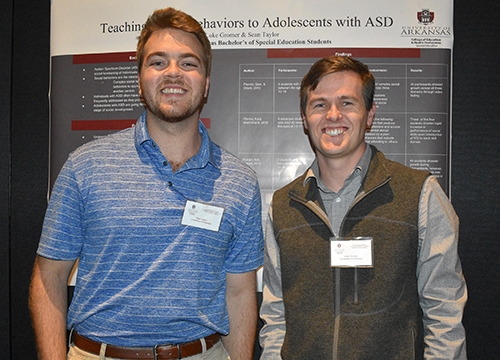
Luke Gromer and Sean Taylor will be in the first class of University of Arkansas students to graduate in May with a bachelor's degree in special education. They presented research last week at the university's annual symposium on autism and developmental disabilities.
The College of Education and Health Profession offers the new degree option as well as a master's degree in special education, graduate certificates in autism spectrum disorders and applied behavior analysis, coursework for an endorsement for dyslexia therapist, and a specialization in transition services.
The college's special education program presented the two-day symposium April 2 and 3 in partnership with Arkansas State University. Keynote speakers were Erik Carter of Vanderbilt University, Valeria Mazzotti of the National Technical Assistance Center on Transition and Jawanda Mast, a parent advocate. Professionals could receive continuing education credit for attending.
Nearly 30 undergraduate and graduate students in special education attended the symposium, helping to facilitate sessions and presenting their research in a poster session. Gromer and Taylor are two of four male students in the first graduating class of the B.S.E. program. Faculty said there were no male students enrolled in the next two upcoming classes.
Gromer said he became interested in teaching children with disabilities when he was a junior in high school. His mother operates several traveling day camps for children with disabilities, and he had worked as a camp volunteer.
Taylor said he became interested in special education as a career when he was a sophomore in high school. He joined a club called Best Buddies because a girlfriend was in it. It was a peer support-type program, and he enjoyed spending time with a boy with autism. They took part in activities from just hanging out together to working on life skills together.
Gromer and Taylor's research poster described studies they found that taught social skills for adolescents with autism. Most of the research they read was with younger children, and they said more research is needed to determine effective ways to work with teens. Their poster covered two studies that used video modeling of social interactions and one that looked at clubs promoting peer support and peer mentoring similar to the one that Taylor had joined in high school.
Both said they would like to complete master's degrees later and would welcome being part of research projects after they begin teaching.
The symposium also featured several sessions presented by local, state and regional experts in working with children with disabilities. More than 200 educational professionals, community service providers, faculty members, university students, self-advocates with disabilities, and family members of children with disabilities attended the symposium.
Topics
Contacts
Heidi S. Wells, director of communications
College of Education and Health Professions
479-575-3138,